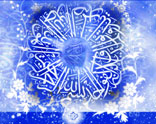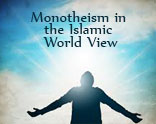Al-Tawhid (4)
Ashura - Popular Distortions and our Responsibility
Fourth Sermon
In the Name of Allah, the All-Beneficent, the Most Merciful.
All Praise belongs to Allah, the Lord of the worlds and the Maker of all creation, and may Peace and benedictions be upon His servant and messenger, His beloved and elect, our master, our prophet, and our sire, Abu al-Qasim Muhammad, may Allah bless him and his pure, immaculate, and infallible Progeny.
I seek refuge with Allah from the accursed Satan:
The common people, the masses, also have an argument against the ulama and the clerics which they often use. They say, "When a fish begins to rot, the rotting begins at the head. The scholars are like the head of the fish and its tail." However, the fact is that in this case the responsibility and the guilt lies both upon the ulama as well as the laity.
One should know that the common people share a responsibility in such cases. In cases such as this, it is the people who let the truth to be obliterated and spread superstitious nonsense.
There is a well-known tradition which is considered reliable by scholars. A man asked Imam Sadiq (A.S.) concerning the Qur'anic verse:
﴾And among them are the illiterate folks who know not the Book but only vain hopes and nothing but conjectures.(2:78)﴿
Here God is critical of the common people from among the Jews. Although He refers to them as having been uneducated, unlettered and illiterate, nevertheless He considers them blameworthy. The questioner, while admitting that the 'ulama' of the Jews' were indeed responsible, asks the Imam as to why the common people among them were held guilty. Was it not a valid excuse that they were illiterate commoners? The tradition is an elaborate one. The Imam replies that such is not the case. He answers that there are certain matters that do require learning and which can only be understood by the learned and which illiterate people do not comprehend. Concerning such issues one may say that the common people are not responsible as they have not acquired learning in religious subjects. True, at times they may be held responsible for not having acquired education, and this could be an argument against them. However, if there are cases where they have no responsibility, that is in issues which require the study of books and proper instruction under teachers. One who has never had any teacher and has never gone to school is not held responsible in such matters. However, there are issues which a normal human being can understand with his natural faculty of a sound mind. Here it is not necessary for one to have gone to school, to have read books and have had teachers. In other words, it does [not] require one to have a diploma or a degree or even to have received middle-school education. All that is needed is sanity and a sound mind. Thereafter, the Imam gives an example. Suppose there is an 'alim who preaches the people to be pious and God Fearing while he himself acts in a manner contrary to piety and God Fearing. He preaches what he himself does not practice and the people observe this contradiction between his word and deed. The Imam points out that it is not necessary for one to be educated and learned in order to see that such men are not worthy of being followed. The common people among the Jews would observe these things with their own eyes and understand them with their minds (wadtarru bi ma'arifi qulubihim).1 With their natural intelligence they could perceive that one must not follow such persons, but in spite of that they would follow them. Therefore they were responsible and guilty.
There are some matters that do not require any education or training or any linguistic expertise in any particular language such as Arabic or Persian or any training in any of such subjects as grammar, law, jurisprudence, logic or philosophy. All that is needed is the natural gift of intelligence and they (the common people among the Jews) did possess this. They perceived these things with their natural intelligence. The Noble Prophet (peace be upon him and his household) has a saying which is one of the profoundest because of its innate self-evident character. He said:
The value of works depends solely on intentions, and everyone's recompense depends on his intentions.2
It means that the significance and worth of one's actions depends on one's intentions. If you do something unintentionally you are not guilty if it is something bad and if it is something good you do not deserve any reward.
Now if someone were to come and relate a dream and a story about someone who is forgiven his sins and admitted to the highest stations of paradise due to something that happened to him in a condition of unconsciousness in which his will and intention had played no role whatsoever, or rather his real intentions were quite the opposite, should we accept such a thing? Does it require book learning? Does it need literacy or the knowledge of Arabic? Only repentance and a return to God can free one from his sins:
Indeed, hell shall not touch a body, whereupon lies the dust of the feet of Husayn's pilgrims!
It is a nice line poetically, but is unfortunately untrue from the viewpoint of the teaching of Imam Husayn.
The second point, which I must mention before describing this responsibility and duty relates to the dangers that lie in these distortions. Let us briefly discuss the dangers that lie in distortion of facts. We have already discussed the various kinds of distortion that have occurred in relation to the historic event of 'Ashura and the factors responsible for such distortions. It is possible that some people might think, 'After all what is wrong with tahrif?' What harm can it do and how can it create any danger?' The answer is that the danger of tahrif is extraordinarily great. Tahrif is an indirect blow which is more effective than a direct one. If a book is corrupted (whether in respect of its wording, or its meaning and content) and it is a book of guidance, it is transformed into a book that is misleading. If it is a book of human felicity it is transformed into a book of human wretchedness. If it is a book that edifies and elevates human beings, as a result of corruption it is changed into one that brings man's fall and degeneration. Basically it alters the very form of reality and not only makes it ineffective it has a reverse effect.
Everything is prone to certain hazards which are related to its nature. The Noble Prophet (peace be upon him and his household) said:
There are three hazards for religion: the scholar of evil conduct, the tyrannical leader (ruler), and the person who is diligent in practicing religion but is ignorant.3
That is, there are three dangers for religion: 1) scholars who are evil and vicious in their conduct; 2) leaders who are tyrannical and unjust; 3) devout persons who are ignorant. The Prophet has considered them hazards for the faith. In the same way that plants and animals are affected by certain pests and diseases, and in the same way as the human body is prone to certain diseases and disorders, religion, creed and faith are also prone to certain dangers. Distortions of the faith, which are brought about by two out of the three categories of people mentioned by the Noble Prophet, that is, scholars of evil conduct and ignorant and sanctimonious persons, are a hazard for the faith and are destructive for religion. Corruption and distortion alter the content of a message of deliverance and the people who accept it as the truth derive an opposite result.
Ali (A.S.), a figure with all that greatness, has a strangely distorted personality in the outlook of some people. Some people know Ali (A.S.) only as an athlete. At times some people of very suspect motives publish pictures of Ali that show him bearing in hand a two-tongued sword, like a pythons tongue, and with facial features and expression one does not know from where they have got them. It is definite that a picture or statue of Ali or that of the Prophet never existed. They have painted such a strange face that one can hardly believe that it is the same Ali famous for his justice, the Ali who wept at nights for the fear of God. The face of a devout man, of someone who is used to nightly worship, of someone who engages in istighfar at nights, the face of a sage, a judge, a man of letters is a different face.
There is another thing which is quite popular especially amongst us Iranians. We refer to the Fourth Imam (A.S.) as "Imam Zayn al-'Abidin-e Bimar" (i.e. the sick one). In no language do we ever come across the epithet bimar along with the name of Imam Zayn al-'Abidin. Such an epithet does not exist in Arabic. He has a number of appellations, one of which is al-Sajjad (i.e. one who prostrates a lot), another is Dhu al-Thafanat (i.e. one who has callouses on his forehead, due to prostrations). Do you find any book in Arabic that may contain an epithet synonymous with the word bimar for the Imam? Imam Zayn al-'Abidin (A.S.) was only ill during the days of the episode of 'Ashura (perhaps it was an act of providence meant to save the Imam's life and to preserve the progeny of Imam Husayn) and this very illness saved his life. Several times they wanted to kill the Imam, but as he was seriously ill, they would leave him saying, Innahu li-ma bih4 i.e., Why should we kill him. He is himself dying. Who in the world has not fallen ill at some time or another during his life? Apart from this instance of his illness, see if you can find any other reference stating that Imam Zayn al-'Abidin was sick. But we have pictured Imam Zayn al-'Abidin as someone chronically ill, pale faced, suffering from fever and as someone bent with weakness and always carrying a walking stick and someone who moans as he walks!
The same distortion and lie about the Imam's figure has led some people to continually groan and moan and make themselves appear as chronically sick so that people may revere them for that and say, "Look at him, he is just like Imam Zayn al-'Abidin the Bimar!" This is distortion. Imam Zayn al-'Abidin was not any different from Imam Husayn (A.S.) or Imam Baqir (A.S.) in respect of physical health and constitution. The Imam lived for forty years after the event of Karbala' and he was quite healthy like others and was not different from Imam Sadiq (A.S.), for instance, in this regard. Why should we then call him "Imam Zayn al-'Abidin the Bimar"5
Imamate means being a model and an exemplar. The philosophy of the Imam's existence is that he is a human being of a superhuman caliber, like the prophets, who introduced themselves in these words so that the people may follow them as higher models of humanity:
We beseech God, the Blessed and the Exalted, to lead our hearts towards the truth, to forgive us the sins which we have committed through tahrif and otherwise, to grant us the ability to carry out successfully the duty and mission that we have in this field.
* Martyr Murtada Mutahhari. Translated from the Persian by 'Ali Quli Qara'i. Vol XIII No. 4 (Winter 1996).
* Notes to part 4:
1- Al-Tabrisi, al-Ihtijaj, vol.2, p.457.
2- Al-Majlisi, Bihar al-anwar, vol. 7, p. 225; al-Jami' al-saghir, vol. 1, p. 3.
3- AI-Jami' al-saghir, vol. 1, p. 4.
4- Bihar al-anwar, vol. 45, p. 61; A'lam al-wara, p. 246; ash-Shaykh al-Mufid, al-Irshad, p. 242.
5- In the late Ayati (r), may God have mercy upon him, we have lost an invaluable asset. Five or six years ago this great man gave a lecture on the method of tabligh in one of the monthly sessions of a religious association. It was published in the second volume of Guftar-e mah. There he raised this very issue. He said, "What is this absurd notion that we attribute sickness to Imam Zayn al-Abidin? We have given such an appellation to the Imam that anyone who hears it imagines that the Imam was sick all his life." Then he related an episode that had occurred recently He said, "Some time ago I read an article in one of the periodicals where the author had complained about the plight of the government and government employees, stating that most of the government servants and officials were either incompetent or corrupt. They were either competent and corrupt, or honest and incompetent." He had cited verbatim the words of the author; who had written, "Most of the government officials are either of the type of Shimr or that of Imam Zayn al-'Abidin-e Bimar; whereas we need persons who are competent like Hadrat Abbas." He meant that Shimr was corrupt and competent, whereas Imam Zayn al-'Abidin-e Bimar was pious but - na'udhubillah - incompetent, and that Hadrat Abbas was both pious and competent. See how an apparently small distortion leads to such a great deviation.
6- Safinat al-bihar, vol. 1, p. 63; Usul al-Kafi, vol. 1, p. 54.




















